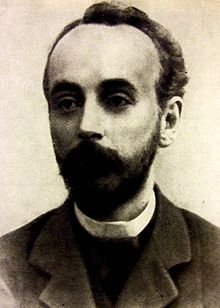Gleb Maximilianowitsch Krschischanowski
Gleb Krzhizhanovsky ( Russian Глеб Максимилианович Кржижановский ; born January 12 . Jul / 24. January 1872 greg. In Samara , † 31 March 1959 in Moscow ) was a Russian revolutionary and Soviet politician.
Life
Krschischanowski came from a noble family. His father was of Polish origin (Polish spelling of the name: Krżyżanowski); his mother was Elvira Rosenberg, a German. He studied at the Petersburg technical college, which he graduated with success as an engineer in 1894. From his youth he was interested in revolutionary movements and in 1891 he joined one of the first Marxist circles in what was then the Russian Empire. In 1893 he temporarily took over the leadership of the Marxist Kampfbund for the liberation of the working class in Saint Petersburg , which was one of the forerunners of the later Communist Party of the Soviet Union . There he met the young Vladimir Ulyanov , who at that time had only just begun his revolutionary activity. In December 1895 the members of the "Kampfunion" were arrested and in February 1897 exiled to Eastern Siberia. Krschischanowski took an active part in all Russian revolutions since 1905. Since 1904 he was a member of the Central Committee of the RSDAP , which he left the following year as a sign of protest against the, in his opinion false, compromise policy towards the Mensheviks .
After serving his sentence, he worked as a locksmith and fitter. In 1902 he headed an office for the revolutionary social democratic newspaper Iskra in his native Samara . From 1903 to 1905 he lived in Kiev , where he was employed in a railway works. During the 1905 Revolution he appeared in Saint Petersburg, where he was one of the managers of the laboratory that made bombs. Arrested and exiled again after the revolution was put down. From 1910 he lived in Moscow, where he was employed as an engineer at the city power plants. He was one of those who left the Bolsheviks after the defeat of the revolution of 1905 and only returned to them after the victory of the October Revolution. After the October Revolution he took over the management of various economic organizations, first in Moscow, then throughout Soviet Russia. Since January 1920 he was responsible for the development and implementation of the GOELRO plan for electrification and the associated modernization of the country. From 1921 to 1923 and from 1925 to 1930 Krschischanowski was chairman of the Gosplan . In this role he played a key role in the development of the First Five-Year Plan and the associated industrialization of the Soviet economy. He was considered one of the fathers of reconstruction politics. From 1923 to 1926 he was rector of the Lomonosov Institute of Mechanics in Moscow. From 1930 to 1932 he was chairman of the State Committee for Energy Policy Glawenergo . After that, he disappeared from politics and only held insignificant positions within the Soviet economic administration. At the same time he concentrated more and more on scientific activity. From 1929 to 1939 he was Vice President of the Soviet Academy of Sciences , of which he had been a member for several years. From 1930 and until his death in 1959 he was director of the Energetic Institute of the Academy of Sciences, which he founded and which developed into a research center for scientific problems in energetics and electrification and which had already borne his name since the mid-1930s.
Krschischanowski was a member of the Central Committee of the Communist Party from 1924 to 1939 and a deputy of the Supreme Soviet from 1937 to 1945 . From 1925 to 1931 he was a member of the editorial board of the first edition of the Great Soviet Encyclopedia .
In 1957 he was awarded the Order of Heroes of Socialist Work in recognition of his “services to the October Revolution” . After his death, the urn with his remains was buried on the Kremlin wall .
Krschischanowski was married to Sinaida Newsorowa since 1899. Since 1968, the apartment in Moscow that he and his family had lived in for years was turned into a museum.
Works (selection)
- Osnownye sadatschi elektrifikazii Rossii (German: main problems of the electrification of Russia). Moscow, 1920.
- Velikij Lenin (German: The Great Lenin). Moscow, 1968.
literature
- Article about Krschischanowski in: Bolschaja rossijskaja enziklopedija. Moscow, 2008.
- K. Zalessky. Imperija Stalina. Moscow, 2000 (German: Stalin's Imperium).
Web links
| personal data | |
|---|---|
| SURNAME | Krschischanowski, Gleb Maximilianowitsch |
| ALTERNATIVE NAMES | Krzyzanowski, Gleb; Кржижановский, Глеб Максимилианович (Russian) |
| BRIEF DESCRIPTION | Russian revolutionary and Soviet politician |
| DATE OF BIRTH | January 24, 1872 |
| PLACE OF BIRTH | Samara |
| DATE OF DEATH | March 31, 1959 |
| Place of death | Moscow |
